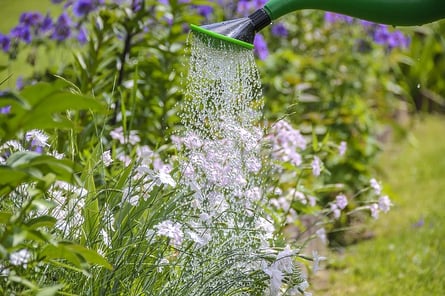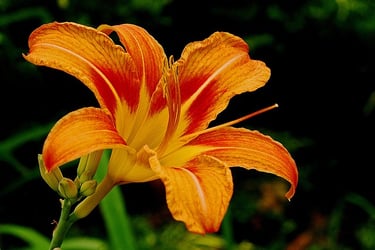 Roses and irises are in bloom and on Saturdays the parking lots at local garden centers are jam-packed—gardening season is in full swing here in Greenville, SC!
Roses and irises are in bloom and on Saturdays the parking lots at local garden centers are jam-packed—gardening season is in full swing here in Greenville, SC!
Chances are if you’re the gardening type, you’ve gotten the bulk of this season’s planting work already done, and you’re moving into the maintenance stage of keeping up your yard.
Just because your lawn and flowers will need plenty of water this summer doesn’t mean your water bill needs to climb sky high. Here are some handy tips for conserving water in your yard so you can keep your wallet as happy as your plants!
Avoid afternoon watering
Sure, your plants may look thirsty during the blazing noon, but watering them then won’t help much. When you water during the heat of the day, most of the moisture will evaporate before the plant can benefit from it, and you’ll find yourself needing to give it more and more to keep it thriving.
Water either in the early morning (leaving enough time for the root system to absorb the water before the heat starts) or in the evening.
Monitor your sprinkler system
Don’t let your automatic irrigation system run on autopilot! The next time your sprinklers turn on, watch where the water ends up. Are you watering the wrong places, such as your driveway? Are you overwatering until your grass gets soggy?
You may need to fine-tune your watering times according to the season, the type of soil you have and the life stage of your plants. (If you’re interested, here’s a detailed guide to watering your lawn.) Also, turn the sprinklers off during rainy days—you’re literally just throwing money away!
The more you pay attention, the better steward you’ll be of your water. Don’t just set it and forget it!
Use mulch
One of the not-so-secret tricks to great gardening is the use of mulch, which may consist of any number of materials: wood bark, pine needles, straw, grass clippings, leaves, cocoa shells, shredded tires, you name it.
Mulch applied around the roots of plants or throughout the entire garden bed allows moisture to get in, but slows down the evaporation process so the soil retains water better. As an added bonus, it discourages weeds from growing.
Select water-efficient plants
 By selecting plants that aren’t high maintenance for water, you can get away with watering less often. Plants that require less water include:
By selecting plants that aren’t high maintenance for water, you can get away with watering less often. Plants that require less water include:
- Bermuda grass (for lawns)
- Blue Spire (a.k.a. Russian sage)
- Daylily
- Echinacea (a.k.a. coneflower)
- Hydrangeas
- Lavender
- Rhododendrons (after they’ve had a few years to get established)
- Salvia
- Yarrow
Most fruits and vegetables do require a lot of water, but you can offset the extra they require by planting drought-tolerant plants close by.
Use a rain barrel
If you really want to get serious about water conservation, store water from your gutters using a rain barrel that you either purchase or make yourself. Note that this is more than just an open barrel (which can invite mosquitoes and other nasties that like stagnant water), but a system that typically has a filter on the top and a spigot on the bottom.
Pull from this store for gardening before turning on your hose and you can save on your water bill—after all, rain is free!
Water bill still high?
If after putting these and other water saving tips to use your water bill is still unusually high, you may be dealing with a hidden leak or another major issue. Before it turns into something bigger, be sure to have a licensed plumber come take a look!

.png)